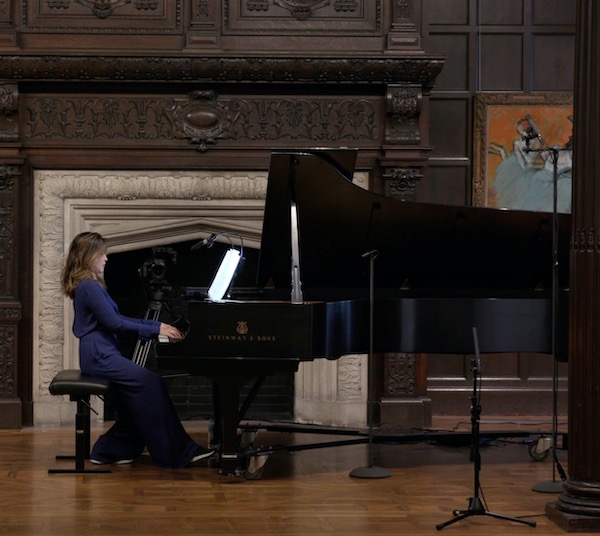Min Kwon brings her “America/Beautiful” project to Phillips Collection

Min Kwon performed her “America/Beautiful” project Sunday at the Phillips Collection. Photo: Dominic Mann Visuals
American pianist Min Kwon took advantage of the pandemic shutdown to launch a commissioning project she entitled America/Beautiful. At this point, 75 composers have responded by composing new pieces inspired by the melody of “America the Beautiful.” After an online debut this summer, Kwon has taken the project on tour, including a stop at the Phillips Collection for a live streamed recital Sunday afternoon.
Kwon is a long-time admirer of the melody of “America the Beautiful,” originally composed for words other than the patriotic poem written by Katharine Lee Bates in 1893, during a visit to Pikes Peak. In a way Kwon has brought the famous hymn back home: Kwon teaches at Rutgers in New Jersey, the state where Samuel A. Ward was a choirmaster at the time he wrote the melody in 1882.
Most of the composers focused on the combination of two signature intervals in the melody, a descending minor third followed by a descending perfect fourth. This motif is heard three times in the hymn, at the words “O beautiful, for spacious skies” (repeated at “For purple mountain majesties”) and again at “And crown thy good with brotherhood.” In the pieces featured, one heard these elements filtered through a kaleidoscope of musical styles.
Kwon selected three sets of pieces, stating they represented to her three different feelings about America: dark misgivings, hope, and then light-hearted fun. John Harbison wrote the first piece, “Getting the Upper Hand on America,” for right hand alone. Kwon brought out both the tune, set straightforwardly, and the zippy, ragtime-inspired clothing around it with utter clarity.
Richard Danielpour’s “DESECRATION” combined the melody, in the piano’s upper register, with ominous undertones in the bass. This disquiet clashed dissonantly with the tune, although it returned serenely at the end. Judith Lang Zaimont’s “In Darkness Veiled” provided a counterweight, playing with the tune in the minor mode and in a fantasy style reminiscent of Rachmaninoff.
Vijay Iyer went a similar direction in “Crown Thy Good,” with the melody spun out in a sort of minor-mode cantillation, smeared into clusters by the sustaining pedal. With a repeating harmonic pattern undergirding the piece, Kwon gave it the feel of an improvisation, a repeated-note ostinato amping up the middle section. David Serkin Ludwig echoed the sense of mourning cantillation in his variation, “Qaddiš,” the tune a distant echo over dissonant thunder.
Hope came across in the middle part of the program, first as pulsating accompanying motifs on the minor third in Huang Ruo’s “Meditation on America the Beautiful,” in an energetic minimalistic repetition. Nico Muhly’s “REFINE” struck the same vibe of minimalistic repetition, with some more straightforward setting of the tune in extended harmonies.
A highlight came in Sebastian Currier’s “23 Variations on America,” a tasting menu of aggressive mini-variations in a dizzying array of musical styles. Kwon tamed all of the piece’s considerable virtuosic demands, evoking Webern, Bartók, Stravinsky, and others, with fierce technical skill.
In Lei Liang’s “America the Beautiful…devastatingly quiet” Kwon picked out the tune delicately and spaced out over anxious silences, with the una corda pedal muting the sound. Occasional loud strikes included a thud on a string damped by her hand under the piano lid. Liang was the first composer on this program to draw notably on what is perhaps the most characteristic interval of the tune, the major sixth opening the refrain “America, America.”
Greg Sandow’s “America Slow Dance and 12-tone America” kicked off the fun final section of the recital, refracting the tune through the lenses of 1950s doo-wop and, for something completely different, the dodecaphonic process of Webern. In “Amber (Variation)” Libby Larsen gets credit for riffing on a different section of the melody, the rising scale at the words “for amber waves of grain.” Kwon brought out the rustling of a prairie wheat field in the scales rushing upward.
Two of the strongest pieces came towards the end, beginning with “America the Polarized” by Texu Kim, a Korean-born composer who has just become an American citizen. In the style of a big-hearted Lisztian paraphrase, Kim brought together pieces of the tune with other music, most overtly Beethoven’s “Für Elise.” Trevor Weston “A Fantasy on America” went for different influences, from a Prokofiev-style toccata to a Gershwin fantasy and Caribbean rhythms.
Victoria Bond’s “Sea to Shining Sea” offered Kwon an ideal patriotic showpiece to conclude the published program. After reaching an initial climax on that broad major sixth interval of the hymn’s refrain, Kwon launched into an ecstatic bell-like ostinato on the motif from “from sea to shining sea.” This happy buoyancy was immediately undercut by Timo Andres’ “American Coda,” in which a lilting theme, alluding subtly to the hymn, was gradually engulfed by a riotous bass cacophony.
Not wanting to leave the listener with this worrisome emotion, Kwon offered John Musto’s tongue-in-cheek “Habanera” as an encore. Setting the hymn tune as a rag with Cuban overtones, it provided the greatest whimsy of the afternoon.
The Phillips Collection presents a recital by pianist Kit Armstrong, on the theme of images in music, 4 p.m. October 24. The museum’s Sunday concert series will reopen to a limited-capacity live audience starting on November 2. phillipscollection.org
